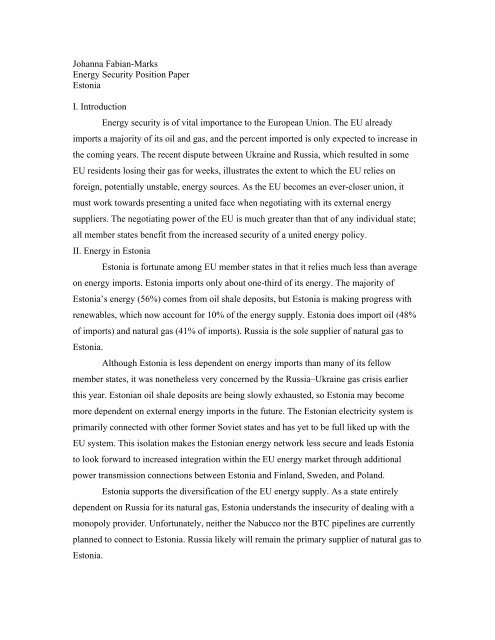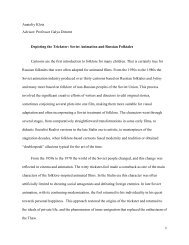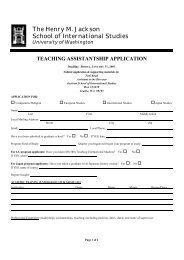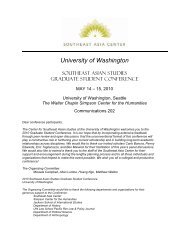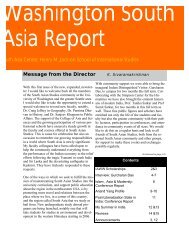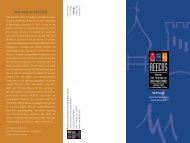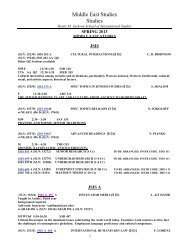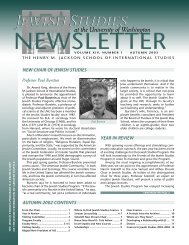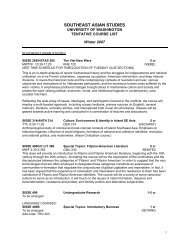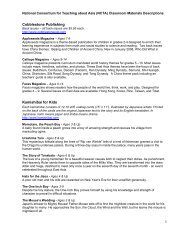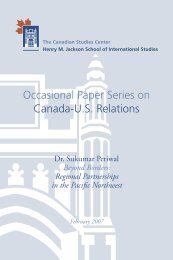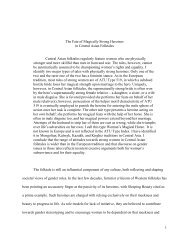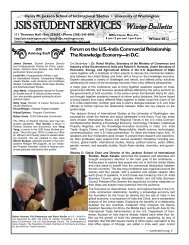Johanna Fabian-Marks Energy Security Position Paper Estonia I ...
Johanna Fabian-Marks Energy Security Position Paper Estonia I ...
Johanna Fabian-Marks Energy Security Position Paper Estonia I ...
You also want an ePaper? Increase the reach of your titles
YUMPU automatically turns print PDFs into web optimized ePapers that Google loves.
<strong>Johanna</strong> <strong>Fabian</strong>-<strong>Marks</strong><br />
<strong>Energy</strong> <strong>Security</strong> <strong>Position</strong> <strong>Paper</strong><br />
<strong>Estonia</strong><br />
I. Introduction<br />
<strong>Energy</strong> security is of vital importance to the European Union. The EU already<br />
imports a majority of its oil and gas, and the percent imported is only expected to increase in<br />
the coming years. The recent dispute between Ukraine and Russia, which resulted in some<br />
EU residents losing their gas for weeks, illustrates the extent to which the EU relies on<br />
foreign, potentially unstable, energy sources. As the EU becomes an ever-closer union, it<br />
must work towards presenting a united face when negotiating with its external energy<br />
suppliers. The negotiating power of the EU is much greater than that of any individual state;<br />
all member states benefit from the increased security of a united energy policy.<br />
II. <strong>Energy</strong> in <strong>Estonia</strong><br />
<strong>Estonia</strong> is fortunate among EU member states in that it relies much less than average<br />
on energy imports. <strong>Estonia</strong> imports only about one-third of its energy. The majority of<br />
<strong>Estonia</strong>’s energy (56%) comes from oil shale deposits, but <strong>Estonia</strong> is making progress with<br />
renewables, which now account for 10% of the energy supply. <strong>Estonia</strong> does import oil (48%<br />
of imports) and natural gas (41% of imports). Russia is the sole supplier of natural gas to<br />
<strong>Estonia</strong>.<br />
Although <strong>Estonia</strong> is less dependent on energy imports than many of its fellow<br />
member states, it was nonetheless very concerned by the Russia–Ukraine gas crisis earlier<br />
this year. <strong>Estonia</strong>n oil shale deposits are being slowly exhausted, so <strong>Estonia</strong> may become<br />
more dependent on external energy imports in the future. The <strong>Estonia</strong>n electricity system is<br />
primarily connected with other former Soviet states and has yet to be full liked up with the<br />
EU system. This isolation makes the <strong>Estonia</strong>n energy network less secure and leads <strong>Estonia</strong><br />
to look forward to increased integration within the EU energy market through additional<br />
power transmission connections between <strong>Estonia</strong> and Finland, Sweden, and Poland.<br />
<strong>Estonia</strong> supports the diversification of the EU energy supply. As a state entirely<br />
dependent on Russia for its natural gas, <strong>Estonia</strong> understands the insecurity of dealing with a<br />
monopoly provider. Unfortunately, neither the Nabucco nor the BTC pipelines are currently<br />
planned to connect to <strong>Estonia</strong>. Russia likely will remain the primary supplier of natural gas to<br />
<strong>Estonia</strong>.
III. Proposals/Objectives<br />
<strong>Estonia</strong> completely agrees with the Czech Republic that the EU must have a clear and<br />
strong external energy policy. All EU countries will benefit from having a united voice at the<br />
bargaining table, but smaller countries like <strong>Estonia</strong> particularly appreciate the importance of<br />
cooperating to maximize influence. As the <strong>Estonia</strong>n Foreign Policy Institute concluded,<br />
“Bilateral relations open opportunities for Russia to manoeuvre in relations with the EU by<br />
taking advantage of discords between individual Member States and the European<br />
Commission.” 1 The <strong>Estonia</strong>n President, Toomas Hendrik Ilves, put it even more bluntly,<br />
“Russia has used energy as a foreign policy instrument against <strong>Estonia</strong> for 15 years and will<br />
continue to do so . . . There must be an awareness that energy can be used for manipulation.” 2<br />
Bilateral deals with Russia may seem to be in a member state’s best interest, but in the long<br />
run all member states will benefit more from a united approach to Russia and other external<br />
energy suppliers. <strong>Estonia</strong> proposes that the EU move towards eliminating bilateral deals with<br />
external energy suppliers.<br />
<strong>Estonia</strong> also joins the Czech Republic in its support for energy diversification. It is<br />
unwise for the EU to depend on any one region, be that Russia or elsewhere. The Nabucco<br />
and BTC pipelines expand the options available to the EU and therefore increase its security.<br />
Competition should improve the energy market for EU consumers. The Nabucco pipeline<br />
merits EU funding. Nabucco is also a good example of the difficulties bilateral energy deals<br />
may engender. Originally supported by a number of EU states, Nabucco has languished as<br />
Russia made a concerted effort to “divide and concur” by wooing away its supporters.<br />
The EU must press Russia to ratify the <strong>Energy</strong> Charter Treaty and to accept its<br />
requirement that Russia allow third-parties to transport gas and other forms of energy through<br />
its network. The <strong>Energy</strong> Charter builds an international legal foundation for energy security<br />
and aims “to strengthen the rule of law on energy issues by creating a level playing field of<br />
rules to be observed by all participating governments”. 3 Ratification of the <strong>Energy</strong> Charter<br />
Treaty will make Russia subject to the dispute resolution mechanism of the Treaty, which<br />
will be useful if future energy disputes involving Russia.<br />
1<br />
<strong>Estonia</strong>n Foreign Policy Institute. <strong>Energy</strong> <strong>Security</strong> of <strong>Estonia</strong> in the Context of the <strong>Energy</strong> Policy of the<br />
European Union. September 2006.<br />
2<br />
EU Business.com. “Russia uses energy to squeeze EU: <strong>Estonia</strong> president.” 29 December 2006.<br />
3<br />
“About the Charter.” <strong>Energy</strong> Charter Treaty. Accessed 17 February 2009 at www.encharter.org


